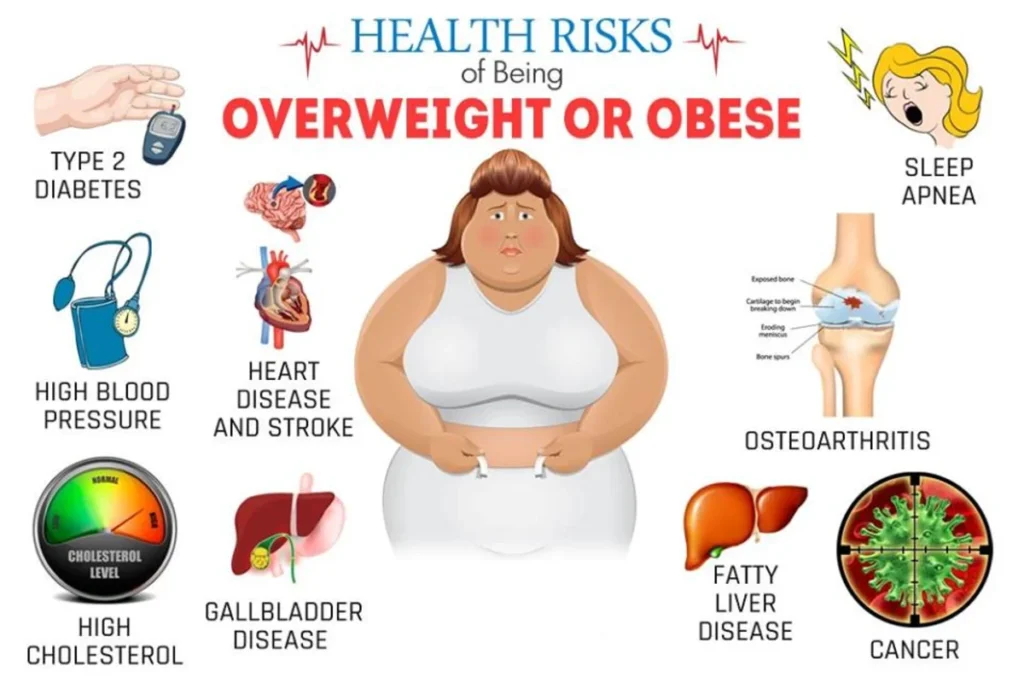
Why worry about obesity? Is it not good life?
In many African societies, obesity is often viewed as a sign of prosperity, success, or “good living.” However, this perception hides the serious health risks associated with being overweight or obese.
Obesity is not just a cosmetic issue; it is a chronic health condition that increases the risk of developing many serious diseases. In sub-Saharan Africa, where lifestyle changes are driving a rise in obesity rates, it is crucial to understand its dangers and take action before it’s too late.
What is obesity?
Obesity occurs when a person has an excessive amount of body fat.
It is usually measured using the Body Mass Index (BMI), which compares a person’s weight to their height. As a general rule, a BMI of 25-29.9 is classified as overweight, while a BMI of 30 or higher is considered obese.
While BMI is not a perfect measurement, it is a useful tool for identifying individuals who are at risk of developing health complications.
How is the the Body Mass Index (BMI) calculated?
Body mass index (BMI) is calculated by dividing a person’s weight in kilograms by their height in meters squared. Here’s the simplest method:
- Measure your weight in kilograms (kg).
- Measure your height in meters (m).
- Square your height: Multiply it by itself (e.g., 1.7m x 1.7m = 2.89m²).
- Divide your weight by the squared height:
BMI = Weight kg Height m 2BMI=Height m 2Weight kg
Example:
If you weigh 70kg and are 1.7m tall:
Why worry about obesity?
Obesity is a major risk factor for several chronic conditions, many of which are leading causes of death in sub-Saharan Africa and around the world. Here are some of the most concerning health risks associated with obesity:
- Heart Disease: Obesity raises the risk of high blood pressure, high cholesterol, and type 2 diabetes, all of which can lead to heart disease. In fact, people with obesity are at a higher risk of having a heart attack or stroke.
- Type 2 Diabetes: Obesity is the leading cause of type 2 diabetes, a condition in which the body becomes resistant to insulin. Diabetes can lead to serious complications like kidney failure, nerve damage, blindness, and cardiovascular problems.
- Hypertension: Obesity puts more pressure on the arteries, increasing the risk of high blood pressure. Left untreated, hypertension can damage organs such as the heart, brain, and kidneys.
- Certain Cancers: Obesity has been linked to an increased risk of several cancers, including breast cancer, colorectal cancer, and liver cancer. The exact reasons for this are still being studied, but inflammation and hormonal changes related to obesity likely play a role.
- Sleep Apnea: Obesity can cause sleep apnea, a condition where a person’s breathing is interrupted during sleep. This can lead to daytime fatigue, heart disease, and other complications.
- Joint Problems: The extra weight from obesity puts more stress on joints, leading to conditions like osteoarthritis. This can result in chronic pain and reduced mobility.
The many risks (to health) of being overweight or obese.

Understanding the misconception about obesity
In many African societies, weight gain is sometimes seen as a symbol of wealth or status, suggesting that the individual has access to ample food and resources.
While this view may have roots in cultural history, the modern reality is different. As societies urbanize, diets are shifting towards processed foods high in calories, sugar, and unhealthy fats.
At the same time, physical activity levels are declining due to changes in work and lifestyle habits. These factors contribute to a growing epidemic of obesity, which is now recognized as a serious health issue, not a mark of success or prosperity.
Children with obesity are at a risk of living shorter lives: They must be helped, not mocked

What can you do if you are affected by obesity?
While obesity is a complex issue, there are steps individuals can take to reduce their risk and improve their health.
- Adopt a Healthy Diet: Focus on eating more fruits, vegetables, whole grains, and lean proteins. Cut back on processed foods, sugary drinks, and foods high in unhealthy fats. Portion control is also important—eating smaller, balanced meals can help with weight loss.
- Increase Physical Activity: Regular physical activity is one of the most effective ways to prevent or manage obesity. Aim for at least 30 minutes of moderate exercise most days of the week. Activities like walking, jogging, cycling, and dancing can make a significant difference.
- Monitor Your Weight and Health: Regular check-ups with a healthcare provider can help you monitor your weight and keep track of your overall health. If you are overweight or obese, your doctor can provide personalized advice and support.
- Seek Support: Changing lifestyle habits can be difficult, but support from friends, family, or a healthcare provider can make a big difference. In some cases, counseling or joining a weight-loss program may be helpful.
- Consider Medical Treatment: In certain cases, medical interventions such as medications or bariatric surgery may be recommended for individuals who are unable to lose weight through diet and exercise alone. Always discuss these options with a healthcare provider.
Hope and advocacy - Don't easily give up
Though obesity is a significant challenge, it is one that can be managed with the right knowledge and support.
Advocacy efforts are needed to raise awareness about the risks of obesity and the importance of healthy living in African communities.
Governments and health institutions must also focus on creating environments that support healthy choices, such as promoting physical activity, improving access to healthy foods, and offering public health campaigns to educate people about the dangers of obesity.
It is never too late to make changes that can improve your health. Whether you’re just starting on your journey or have been struggling for some time, know that you are not alone, and with the right support and determination, positive change is always possible.


